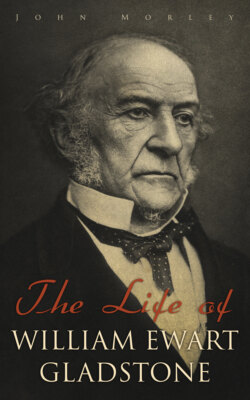Читать книгу The Life of William Ewart Gladstone - John Morley - Страница 71
На сайте Литреса книга снята с продажи.
II
OUT OF PARLIAMENT
ОглавлениеThe acceptance of office vacated the seat at Newark, and Mr. Gladstone declined to offer himself again as a candidate. He had been member for Newark for thirteen years, and had been five times elected. So ended his connection with the first of the five constituencies that in his course he represented. 'I part from my constituents,' he tells his father, 'with deep regret. Though I took office under circumstances which might reasonably arouse the jealousy of my friends, an agricultural constituency, the great majority of my committee were prepared to support me, and took action and strong measures in my favour.' 'My deep obligation,' he says, 'to the Duke of Newcastle for the great benefit he conferred upon me, not only by his unbroken support, but, far above all, by his original introduction of me to the constituency, made it my duty at once to decline some overtures made to me for the support of my re-election, so it only remained to seek a seat elsewhere.' Some faint hopes were entertained by Mr. Gladstone's friends that the duke might allow him to sit for the rest of the parliament, but the duke was not the man to make concessions to a betrayer of the territorial interest. Mr. Gladstone, too, we must not forget, was still and for many years to come, a tory. When it was suggested that he might stand for North Notts, he wrote to Lord Lincoln:—'It is not for one of my political opinions without an extreme necessity to stand upon the basis of democratic or popular feeling against the local proprietary: for you who are placed in the soil the case is very different.'
Soon after the session of 1846 began, it became known that the protectionist petition against the Peelite or liberal sitting member for Wigan was likely to succeed in unseating him. 'Proposals were made to me to succeed him, which were held to be eligible. I even wrote my address; on a certain day, I was going down by the mail train. But it was an object for our opponents to keep a secretary of state out of parliament during the corn law crisis, and their petition was suddenly withdrawn. The consequence was that I remained until the resignation of the government in July a minister of the crown without a seat in parliament. This was a state of things not agreeable to the spirit of parliamentary government; and some objection was taken, but rather slightly, in the House of Commons. Sir R. Peel stood fire.' There can be little doubt that in our own day a cabinet minister without a seat in either House of parliament would be regarded, in Mr. Gladstone's words, as a public inconvenience and a political anomaly, too dark to be tolerated; and he naturally felt it his absolute duty to peep in at every chink and cranny where a seat in parliament could be had. A Peelite, however, had not a good chance at a by-election, and Mr. Gladstone remained out of the House until the general election in the year following.174 Lord Lincoln, also a member of the cabinet, vacated his seat, but, unlike his friend, found a seat in the course of the session.
Mr. Gladstone's brother-in-law, Lyttelton, was invited to represent the colonial office in the Lords, but had qualms of conscience about the eternal question of the two Welsh bishoprics. 'How could the government of this wonderful empire,' Peel wrote to Mr. Gladstone, 'be ever constructed, if a difference on such a point were to be an obstruction to union? Might not any one now say with perfect honour and, what is of more importance (if they are not identical), perfect satisfaction to his own conscience, “I will not so far set up my own judgment on one isolated measure against that of a whole administration, to such an extent as to preclude me from co-operation with them at a critical period.” This, of course, assumes general accordance of sentiment on the great outlines of public policy.' Wise words and sound, that might prevent some of the worst mistakes of some of the best men.
